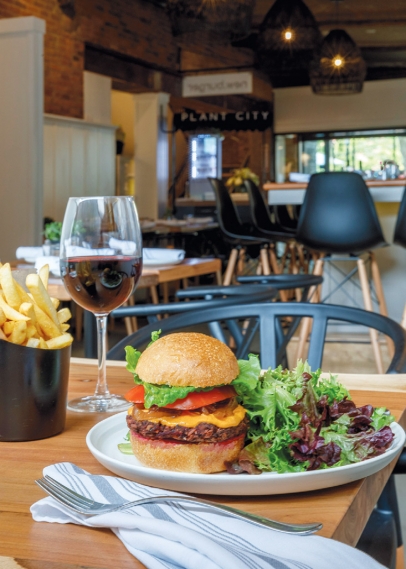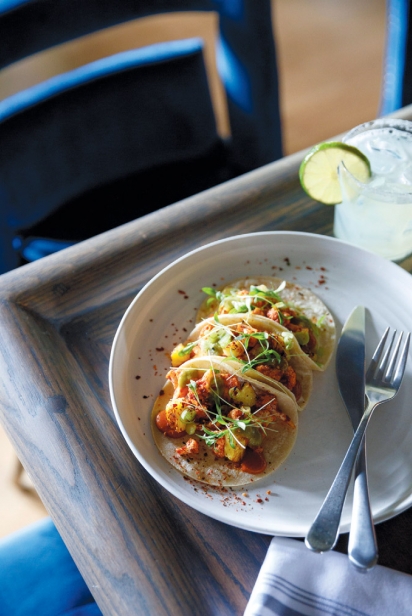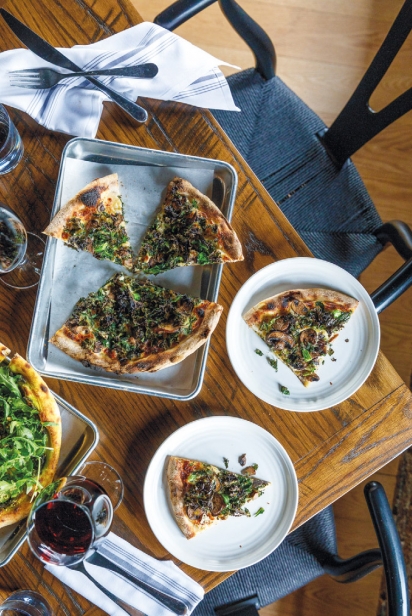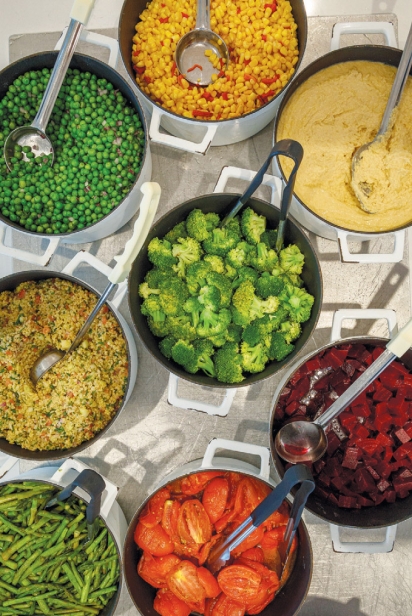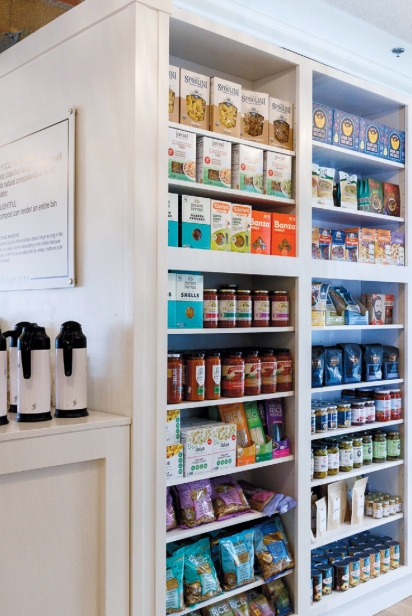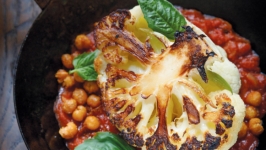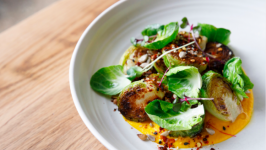Plant City Grows Roots in Providence
A Conversation with Chef, Entrepreneur, Author and Educator Matthew Kenney
Within four weeks of its June 2019 opening, Providence’s Plant City served as many as 50,000 guests in the plant-based, multi-concept food hall. The three-level space encompassing four restaurants, coffee bar, outdoor patio, retail market and communal space for yoga and educational classes is a hip redesign of a preexisting restaurant space in a historic building on South Water Street.
It is owned by Matthew Kenney, an American celebrity chef, entrepreneur, author and educator specializing in plant-based cuisine, as well Rhode Island investor Kim Anderson. Overwhelmed and grateful for the support they’ve received, Kenney told Edible Rhody: “It’s way beyond what we [originally] planned … our entire focus now is to keep improving and evolving the concept and refreshing it so we so we stay current and fresh and lively. That’s our number one goal.”
We spoke with Kenney to find out what drew the internationally acclaimed plant-based chef to set roots here in Li’l Rhody.
Question: Eighteen global cities from Brooklyn and Bahrain to San Francisco and Sao Paulo will host more than 30 Matthew Kenney venues by the end of 2020. Why Providence and how is Plant City different?
Answer: Charlotte MacKinnon, my life partner and creative director, is from Barrington, so we visited Rhode Island often. I used to go to Al Forno; I knew [owners] Johanne Killeen and [the late] George Germon years before my vegan days. The Grange and Wildflour are always busy and Brown University, for example, has many people who are subscribing to or are friendly toward plant-based diets.
Plant City is our first venue under one roof with multiple experiences; it’s an experiential concept where you go one day for a coffee and pastry and the next day have a full four- or five-course meal.
Q: What is your goal in serving exclusively plant-based food? Is your primary interest in improving the health of individuals or the planet?
A: I love food, wine, restaurants; I come from a classical background as a French-trained chef. I didn’t grow up vegan, but 17 years ago I got very passionate about focusing my career entirely on plant-based foods. I found it more creative and interesting. I come at it from a chef’s perspective; I’m not here to convert anyone. The entire mission of our company is to find innovative ways to serve plant-based cuisines at the highest level possible and create it as a legitimate cuisine. I never go into it with the focus of converting anybody.
Q: Even some fast-food chains are now offering vegan burgers made from Impossible Meat or other non-meat alternatives. Is this a short-lived trend or does it confirm your assertion: “The future of food is plant-based?”
A: I envisioned this happening a long time ago; I’m surprised it took some brands so long to figure it out. At the same time, I didn’t anticipate how quickly the tipping point would evolve. I thought it would be a slow, steady and gradual change, but it’s been an explosive change—right now.
I attribute that to several factors: Number one is product availability … when I got into raw vegan food, it wasn’t possible to buy raw cacao beans or the many products available today. Also, education through media and studies. Medical schools are embracing plant-based diets and even creating plant-based medical programs, and some doctors are informing people about the impact of their dietary choices. Films— some are a little provocative—have been really helpful in helping people understand.
Another factor is the influencers—I don’t mean social media influencers, but when people like Richard Branson, Arnold Schwarzenegger and Leonardo DiCaprio stop eating meat … And, smart money is going into plant-based alternatives to help people and the environment. Finally, I guess the last thing is the environment itself. Many people have come to a plant-based diet because of environmental concerns; Branson, Schwarzenegger and James Cameron are perfect examples. I think it’s a convergence of all these factors and that’s what creates a tipping point.
Q: Chef, product developer, consultant, author: Are you an entrepreneur who loves food or a chef who has many ideas? Please explain!
A: [Laughter]. I will always be a chef and think like a chef. That helps me execute ideas and it has given me the skills to know what needs to happen—the number of people involved and the equipment. These days, my job is focused on the company strategy and to bring a lot of options to people, not just through restaurants but through products and other avenues to create more well-executed plant-based options.
I’m really passionate about that being the future of how we eat. I do it because I love plant-based food the best; it’s what gets me excited as a chef. Of course, I care about the environment and animals and human health … but more importantly, I come from the perspective that, to thoroughly enjoy food, we have to be consuming food that’s good for us and good for the planet. Otherwise, it’s more of an ephemeral experience, where it’s great today but tomorrow you wake up and don’t feel well or six months later you might not be as healthy by making the wrong choices. I have a lot of ideas; I’ve spent years working on plant-based [concepts] and a tremendous amount of energy innovating. We have an entire kitchen in Los Angeles just focused on innovation with several chefs just working and testing ... If I develop something or someone on my team develops something, I can’t wait to share it and see it come to life.
Q: By your own admission in Cooked Raw: How One Celebrity Chef Risked Everything to Change the Way We Eat (Familius, 2015), you’ve experienced a number of setbacks and failures. Based on your failures and successes, what is the single best piece of advice you could offer to a budding entrepreneur in the food business?
A: [Laughter] I wouldn’t necessarily recommend my path to the average person. I’m, uh, very bold and want to express the ideas and make them come to life, but I didn’t choose the easiest path: I worked 100 hours a week … but I was OK with my path, because I knew where I wanted to go: I wanted a global company that would offer alternatives and impact the way we eat. The only way to do that was to be in a lot of markets, have a lot of concepts, touch a lot of people and have a talented, diverse team that can do more than I can do on my own—that was my end goal from the beginning.
Q: How are you and your staff connecting with local growers and purveyors and how much local product is being featured on the menus at Plant City?
A: The first thing we do when we go to a new market is to look for the best local, organic, sustainable and seasonable ingredients; everything starts with the ingredients, and we always seek local products. The Rhode Island vendors range from Barrett’s Garden for plant-based cheeses and Borealis Coffee Co. to RI Mushroom Co. and Sprout Organic Farms, for microgreens and specialty garnishes—and there’s more. (See sidebar for the evolving list.)
Q: You grew up hunting and eating meat; what inspired your transition to plant-based eating?
A: It was slow and then all at once. I did hunt really early on, but then I stopped; I didn’t really enjoy it anymore. Then, as I got into cooking, even though my restaurants served meat, I didn’t really eat meat, except on rare occasions. From then, as time went on, I wasn’t eating fish; veggies made me feel better and I liked the taste. By that point, I was telling friends, “Maybe I’ll become a vegetarian”—which sounded odd because I had restaurants that were not vegetarian. One night, I was ready; a friend took me to a vegan restaurant and I just made a decision that night or the next day. I shifted and never went back, about 17 years ago.
Plant City
334 S. Water St., Providence, RI
401.429.2029; MatthewKenneyCuisine.com/Plant-City-PVD
Open 7 days
Plant City’s menus and retail shop feature products from an expanding list of area growers and purveyors, including:
Rhode Island:
Barrett’s Garden
Borealis Coffee Company
Blush Bakeshop
Celebrated Company
Deleite Foods
Farming Turtles
Granny Squibb’s Organic Iced Teas
Leafy Green Tea
Like No Udder
Luluna Kombucha
Miss Vegan
The Nitro Cart
Prica Farina Pasta
Rebelle Artisan Bagels
RI Mushroom Company
Sacred Cow Granola
Sans Gluten Artisan Bakery
Seven Stars
Shady Lane Granola
Sprout Organic Farms
Shri Bark Snacks
Taste Buds
Tortilleria La Mexicana
Connecticut:
Maple Lane Farms
Massachusetts:
Carlson Orchards
Green Thumb
Jonathan’s Sprouts
JP Sullivan & Co.
Quansett Farms
UnReal Candy


